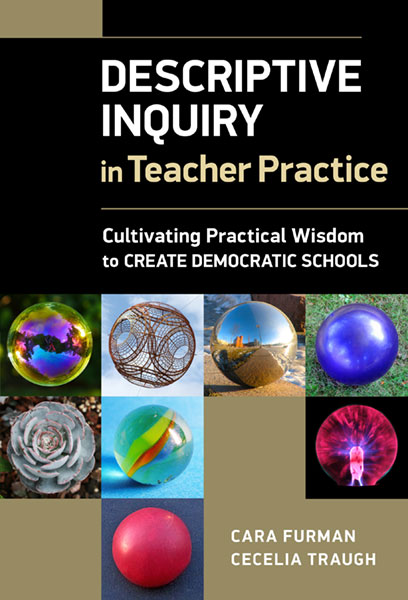Professors: Request an Exam Copy
Print copies available for US orders only. For orders outside the US, see our international distributors.
Cara E. Furman, Cecelia E. Traugh
Publication Date: January 8, 2021
Pages: 216

What does it mean to teach for human dignity? How does one do so? This practical book shows how the leaders at four urban public schools used a process called Descriptive Inquiry to create democratic schools that promote and protect human dignity. The authors argue that teachers must attend to who a child is and find a way to create classrooms that allow everyone to feel safe and express ideas. Responding to the perennial question of how to cultivate teachers, they offer an approach that attends to both ethical development and instructional methods. They also provide a way forward for school leaders seeking to listen to, and provide guidance for, their staff. At its core, Descriptive Inquiry in Teacher Practice champions a commitment to schools as places in which children, teachers, and leaders can learn how to live and work well together.
Book Features:
Cara E. Furman is an assistant professor of literacy education at the University of Maine, Farmington. Cecelia E. Traugh is the dean of the Graduate School of Education at Bank Street College.
“Cara E. Furman and Cecelia E. Traugh’s book Descriptive Inquiry in Teacher Practice: Cultivating Practical Wisdom in Create Democratic Schools (2021) speaks directly to the needs of educators and educational communities during these challenging times. It is a unique voice in this time of crisis, offering a nuanced guide into developing and sustaining democratic school practices that genuinely emerge from schools’ identities.”
—Democracy & Education
“Furman and Traugh offer a compelling testament to how Descriptive Inquiry has been used to work for human dignity in schools.”
—Schools
“Beginning with the question of what it means to teach with human dignity, this wonderful and highly engaging book blends philosophy, narrative, and tools for educators to build community and lead with care. Descriptive Inquiry in Teacher Practice contains lovely illustrations of how schools have enacted a range of descriptive processes, with invitations for readers to engage in their own reflections on key words as a lens for reading the book. New and highly experienced teachers, teacher educators, and administrators who seek to understand how to move their schools forward in these precarious and challenging times will find inspiration, a deeper understanding of themselves and their communities, and concrete ideas in this fine book.”
—Katherine Schultz, dean, School of Education, University of Colorado Boulder
“This wonderful collection of essays reminds me once again how much we owe Pat Carini for framing the ideas and practice of Descriptive Inquiry. It is not a recipe or a protocol, but a way of being in and with the world. It calls upon our human capacities to develop habits of mind and spirit that foster knowledge, respect, empathy, and democracy.”
—Deborah Meier, teacher, principal, and advocate
Contents (Tentative)
Acknowledgments
Introduction
Cara E. Furman and Cecelia E. Traugh
What Is Human Dignity?
What Is Teaching?
Democracy and Teacher Development
Sources and Methods
Overview of the Text
Adding to the Conversation
Part I: Philosophical Framings
1. The Need for Practical Wisdom: What It Is and How It’s Developed
Cara E. Furman
Practical Wisdom in a Complex Teaching Situation: My Recollection
Practical Wisdom
Teaching: To Be Effective and Ethical
Origins and Key Criteria of Practical Wisdom
2. The Cultivating of a Practically Wise Teacher Self
Cara E. Furman
The Cultivation of Practical Wisdom
Closing Thoughts
3. Cultivating Practical Wisdom Through Descriptive Inquiry: A Case of Caring of the Self
Cecelia E. Traugh
Putting Values Into Action
Values Shaping Descriptive Inquiry
Closing Comments: Descriptive Inquiry as an Ethical Endeavor
Part II: How Descriptive Inquiry Lived in the Schools: Promoting Human Dignity with Children and Teachers
4. City-as-School: Building a Collaborative Culture Through Descriptive Inquiry
Rachel Seher
Collaborative Cultures
City-as-School
Before Descriptive Inquiry
Starting Descriptive Inquiry
Lessons for School Leadership
Addendum
5. Curricular Values: Exploring the Place of Children, Teachers, and the Culture of School in Building Curriculum
Cara E. Furman with Cecelia E. Traugh
Inquiries Into Writing Curriculum—Cara’s Story
My Experience of the Year and the Review
Descriptive Inquiry and Curriculum: The Principals’ Perspectives
Coming to Know a School’s Curricular Culture
To Be Known Through One’s Work: The Power of Sharing Curriculum and Grappling With Words and Deeds
6. Using Descriptive Process to Rebuild and Sustain a Democratic School Community
Jane Andrias
The School
Revisiting What Was There
Descriptive Process: A Palette of Possibilities
Conclusion
Postscript
Part III: Seeing and acting with Others: How Descriptive Inquiry Supports Practical Wisdom
7. Changing a Perspective: No Easy Task
Cara E. Furman
A Most Noble Deed
The Power of Perspective
Attending
Context
Juxtaposition
Care
Changing Perspective
8. Supporting and Being Supported: Support Team
Cara E. Furman and Alison Hazut
Adjusting Our Vision of Children: Alison’s Narrative
Being Seen as a Teacher and a Learner: Cara’s Narrative
Implications
9. Listening So as to Attend: Descriptions of Cecelia’s Role in Schools
Cara E. Furman, with Cecelia E. Traugh and Laurie Engle
Setting
Listening to Cecelia
Integrated Restatement
Postscript
Part IV: What Does it Mean to Lead Schools for Human Dignity?
10. The Authority of Values Within Collaborative School Communities.
Cecelia E. Traugh, with Rachel Seher and Abbe Futterman
Listening for Meaning
Building School Culture
Negotiating Competing Values
Working on Difficult Issues
Integrative Restatement
11. A Reflection on the Idea of the Practically Wise School
Cecelia E. Traugh and Cara E. Furman
References
Index
About the Authors
Professors: Request an Exam Copy
Print copies available for US orders only. For orders outside the US, see our international distributors.